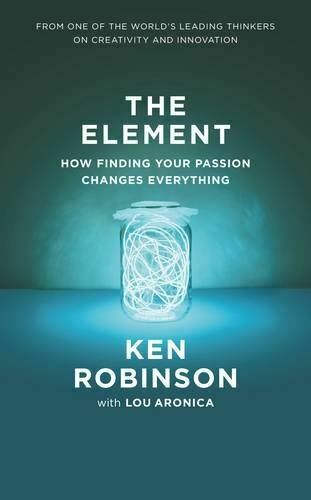Mindset Masters: Ken Robinson
I’m very excited to introduce the next instalment of my blog series Mindset Masters. This month, I’ve been exploring the work of Ken Robinson, who many of you may know already. Robinson is a British author, speaker and international advisor on education to government, non-profits, education and arts bodies.
 In his book, The Element: How Finding Your Passion Changes Everything, Robinson considers the child bored in class, the disillusioned employee and those of us who feel frustrated but can’t quite explain why: and shows how we all need to reach our ‘Element’, the point at which natural talent meets personal passion.
In his book, The Element: How Finding Your Passion Changes Everything, Robinson considers the child bored in class, the disillusioned employee and those of us who feel frustrated but can’t quite explain why: and shows how we all need to reach our ‘Element’, the point at which natural talent meets personal passion.
Robinson believes that too many people never connect with their true talents and therefore they don’t know what they’re really capable of achieving. In that sense, they don’t know who they truly are.
In this month’s podcast, I cover a large part of the book in more detail, and consider how Robinson’s ideas can be used at retirement age. And in this blog, I’ve taken one of the chapters, which covers the question many of us ask ourselves at this stage in life: ’Is it too late?’.
We all know people who feel locked in their lives. They sincerely wish they could do something more meaningful and fulfilling, but at the age of thirty-nine, or fifty-two, or sixty-four, they feel that the opportunity has passed. But there is abundant evidence that opportunities to discover our Element exist more frequently in our lives than many might believe.
For example, Harriet Doerr, the best-selling author, was sixty-five when she returned to college to get a degree in history. But the writing courses she took along the way raised her prose skills to a new level, and she wound up enrolled in Stanford’s creative writing program. She eventually published her first novel, the National Book award-winning Stones for Ibarra, in 1983, at the age of seventy-three.
Julia Child, the chef credited with revolutionising American home cooking and originating the television cooking show, worked as a copywriter and in her mid-thirties she discovered French cuisine and began professional training. It was not until she was nearly fifty that she published Mastering the Art of French Cooking, and her career took off.
Thinking that we need to fulfil our grandest dreams (or at least be in the process of fulfilling them) by the time we’re thirty is outmoded.
If you’re about to turn one hundred, it’s unlikely that you’re going to nail the leading role in Swan Lake, especially if you have no previous dance experience. Some dreams truly are impossible dreams, however, many are not.
One of the most basic reasons for thinking that it’s too late to be who you are truly capable of being is the belief that life is linear. As if we’re on a busy one-way street and there is no alternative but to keep going. But human lives are organic and cyclical. Certainly, we are all getting older by the clock. But I know plenty of people who are the same age chronologically, and generations apart emotionally and creatively.

One of the greatest obstacles to being in our Element is the belief that our minds somehow exist independently of our bodies, like tenants in an apartment. The evidence of research is not only that our physical health affects our intellectual and emotional vitality, but that our attitudes can affect our physical well-being. But equally important is the work you do to keep your mind young. Laughter has a huge impact on aging. So does intellectual curiosity. Meditation can also provide significant benefits to the physical body.
Young brains are in a constant process of evolution and change, and extremely reactive to their environment. During the early stages of development, our brains go through a process that cognitive scientists call “neural pruning.” It gets rid of unnecessary branches to allow for continued growth and increased overall strength. It shuts down pathways that we’ll never use again in order to make room for the expansion of pathways that we will use regularly.
But research indicates that as long as we keep using our brains in an active way, we continue to build neural pathways as we get older. The brain continues to generate new cells, and certain mental techniques, such as meditation, can even accelerate this.
That said, our capacities do deteriorate with age, especially physical athleticism. There’s not much point in denying this, so some of us try desperately to do so, to the point of embarrassing ourselves in public. But in other ways, maturity can be a genuine advantage, for example in the arts. Many writers, artists, poets, painters and composers have produced their greatest work as their insights and sensitivities deepened with age.
We have the capacity to discover the Element at practically any age. As the actor, Sophia Loren once said, “There is a fountain of youth; it is your mind, your talents, the creativity you bring to your life and the lives of the people you love. When you learn to tap this source, you will truly have defeated age.”
The Element is a thought-provoking read, and if you have ever asked yourself, ‘Is it too late?’, I believe it will answer that question. You can hear further ideas from the book – and how they relate to retirement – in my podcast.
Books by George Jerjian

Find your passion!
Dare to Discover Your Purpose is an innovative new online program designed to help you change the way you feel about this important but often misunderstood life stage.
Sign up now to find out more.